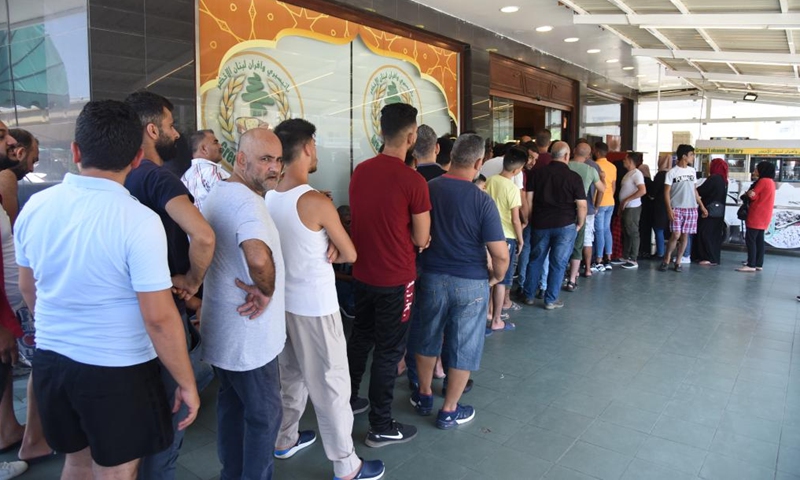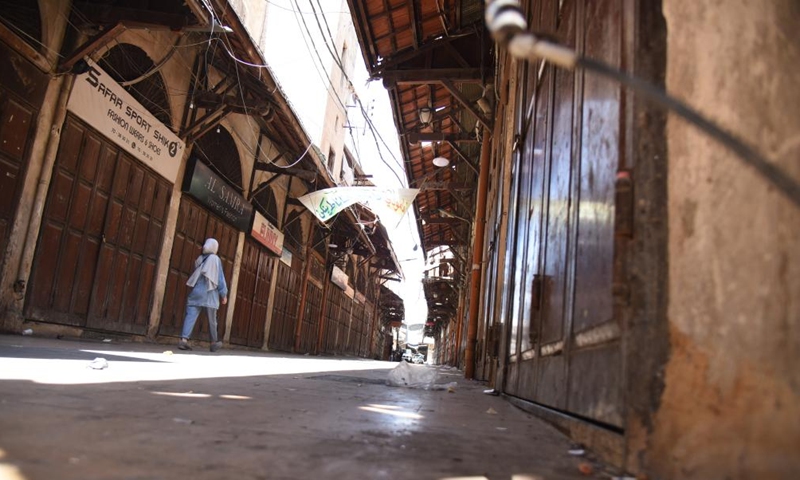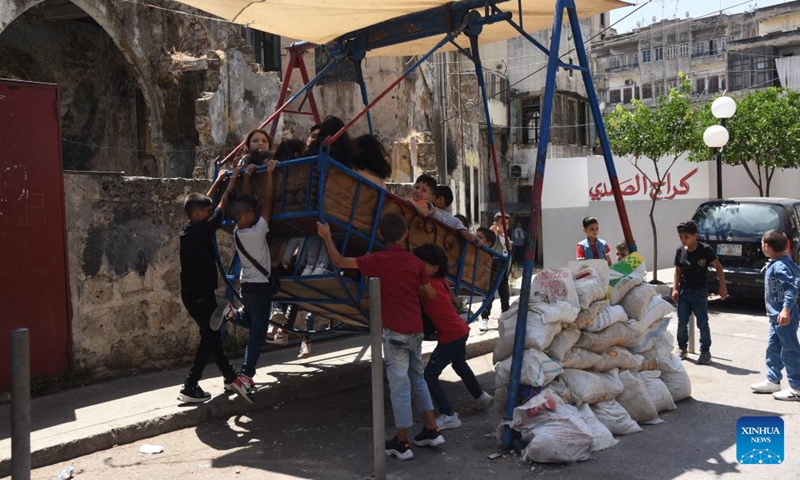
People line up to buy bread at a bakery during the Eid al-Adha holiday in Tripoli, Lebanon, on July 10, 2022.Photo:Xinhua
Celebrating Eid al-Adha this year in the traditional ways has become a vain hope for many Muslims in Lebanon, where the financial crisis and the collapse of the local currency plunged the majority of the population into poverty.
Families used to celebrate the three-day holiday through house gatherings, restaurant visits, gift exchanges, and relaxing at beaches.
Many also kept the tradition of serving visitors Arabic sweets either homemade or bought from popular shops.

A woman walks past closed stores during the Eid al-Adha holiday in Tripoli, Lebanon, on July 10, 2022.Photo:Xinhua
However, as many residents this year are barely capable of securing their basic necessities, the celebration almost becomes a luxury.
"We used to take our children out to a restaurant or a resort, but now our salaries can barely cover a few types of food and necessary medicines," Mehieddine Dirani, who runs a supermarket in Beirut, told Xinhua.
"Instead of going out, we prepare a humble dish at home made from bulgur, lentils and vegetables and watch television," he added.
As for Majida el-Hajj, a resident of Dahieh, a suburb in southern Beirut, she feels sad about not being able to buy Eid clothes for her three children.

Children spend time in a neighborhood during the Eid al-Adha holiday in Tripoli, Lebanon, on July 10, 2022.Photo:Xinhua
"There is nothing I can do for my children to feel the spirit of this occasion," the young mother told Xinhua.
Lebanon has been suffering from an unprecedented financial crisis that resulted in the collapse of the local currency, which devalued people's salaries by over 90 percent. Hit by intertwined political, economic and health crises, Lebanon's poverty rate now rises to over 74 percent, according to the World Bank.
Moreover, the economy has yet to recover from the massive closure of businesses and staff laid-off due to the COVID-19 outbreak and ensuing Beirut port blasts in August 2020.
Hassan al-Saghir, a salesman at Ghazi Hallab, a famous sweets shop in Beirut, told Xinhua that demand for Arabic sweets has dropped by over 50 percent compared to the last year.
His shop used to sell one kilo of Ma'amoul, a traditionally filled butter cookie often served during the Eid holiday, at 35,000 pounds before the crisis. Now it cost 320,000 pounds.
"People are calling me asking prices rather than walking in to make a purchase," he said, adding "most of those who buy from our shops are expatriates or residents who have an income in US dollars."
Aida el-Ahdab, a resident of Basta, a working-class neighborhood in Beirut, told Xinhua her inability to access her dollar savings account forced her to rely on a monthly retirement salary in pounds that is equivalent to 86 dollars in the parallel market.
"I cannot afford to buy a kilo of shop-made Ma'amoul, so I decided to buy two liters of milk and bake pudding which would cost me 130,000 pounds instead," she said.
Many Muslims also gave up the Islamic tradition of Eid sacrifice, which a family would slaughter a sheep to give out at least one-third of the meat to the vulnerable.
Tarek Tahhan, a shepherd in Beirut, told Xinhua the smallest sheep costs 150 dollars while salaries in the public sector have dropped to less than 100 dollars.
The Lebanese government launched last year two cash aid programs for needy families, namely the Emergency Social Safety Net and the ration card policy, both funded by the World Bank.
Lebanon said in January that about 50 percent of its population has registered for social assistance through the social safety net financing plan funded by the World Bank, under the latter's loan of 246 million dollars.
Lebanon also hoped to secure another World Bank loan in support of its ration card policy that aims to pay 556 million dollars in cash to the most vulnerable population.
Caretaker Social Affairs Minister Hector Hajjar told local reporters on Monday that the loan is conditional, and Lebanon has yet to meet all the requirements.
